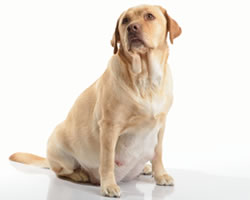
Caring for a pregnant dog can be an exciting time but also a little nerve-racking at first. What do you need to do as a pet parent to help your canine companion through her pregnancy?
Diet and Nutrition:
First and foremost, a complete, balanced and nutritious diet is of the utmost importance in keeping your pregnant dog in good health, as it will prepare her for the next 9 weeks or so of pregnancy and a further 4-6 weeks where she will be under enormous pressure while feeding her litter of puppies.
It is recommended to feed your pregnant dog a high-quality diet that has adequate levels of protein, carbohydrates and fat. Premium adult dog food made by Hills or Royal Canin, as an example are ideal. There is no need to supplement these diets. Homemade diets are not recommended as it is very difficult to attain the correct balance of nutrients, minerals and vitamins needed for pregnancy. In addition, these diets are needed to be fed in large volumes in order to provide the high-calorie requirements.
During the last few weeks of pregnancy and the first few after delivery whilst your dog is nursing her pups, she will consume up to 3 times her normal calorie requirement of food. Whilst its important she receives appropriate nutrition during her pregnancy, it’s important to minimise weight gain caused by over feeding during this time.
Vaccination and Parasite Control:
Its important to ensure your dog is up to date with her worming and vaccinations before she falls pregnant. Check-in with your local Greencross vets to see which products can or cannot be given during pregnancy. Sometimes, changes in hormone levels during pregnancy cause immature roundworms that are sitting in the tissues of the body to become active and even enter the milk supply, these can infect the puppies when they feed from her. Hookworms can also be transferred through the milk.
Chat with your local Greencross vets to see from what age you can worm your pregnant dog. Puppies can be wormed from 2 weeks of age.
If your pregnant dog has not been vaccinated within the last 10-12 months a check-up and booster is recommended prior to her being mated. If this is an unexpected pregnancy, please talk with your local Greencross Vet team as to the most appropriate way to proceed.
A check up by your Greencross Vet during pregnancy provides an opportunity to ask questions and seek advice on diet, worming and vaccination status. An ultrasound, amongst others, can be performed to confirm pregnancy and may also assist in determining how many puppies mum is carrying, however it is not always accurate. Radiographs and blood tests can also be used.
It is important to seek veterinary advice before starting or stopping any of your dog’s healthcare and preventative treatments such as intestinal worming, heartworm prevention or flea control while she is pregnant. If you’re not sure if any of the products you are using will harm your pregnant dog or her puppies, check with your local Greencross Vet.
 Giving Birth:
Giving Birth:
A post whelping check is recommended with your veterinarian 24 hours after the birth of the last puppy. This allows your vet to thoroughly examine your dog and check for adequate milk production, retained foetuses and asses her body condition. At the time of the examination, your vet will also examine the newborn puppies, assesses their body condition and look for any physical abnormalities such as a cleft palate.
 Caring for a whelping dog:
Caring for a whelping dog:
Once the puppies are born your dog may have a variable appetite for the first few days; she may also have a green-blackish diarrhoea particularly if she has eaten the foetal membranes at whelping -this is normal
Provide her with clean bedding; avoid loud noise and disturbing her unnecessarily while she is nursing her pups. While nursing her litter this is the time that she may become excitable, anxious or even become aggressive. She is a protective mum and needs her privacy and space
Feed her small amounts often. There are specific foods available for lactating dogs. Leave non-perishable food out for her throughout the day, any moist or canned food should be offered & if not eaten taken away after 15 minutes. Have fresh water available which is easily accessible to her.

 Greencross Vets
Greencross Vets 







